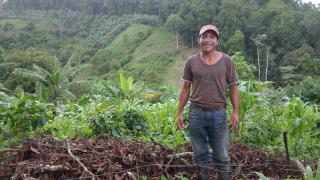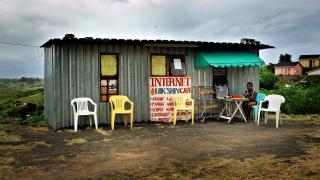How lack of identity is blocking financial inclusion around the world
Globally, 1.7 billion adults are unbanked today [1]— they do not have
an account at a financial institution or via mobile money. This
represents 31% of all adults globally. Being invisible to formal
financial services, they are forced to operate in a cash-only economy
that does not offer the leverage of credit for things like
homeownership, education or even basic medical services.
![Globally, 1.7 billion adults lack a financial account [1]](https://www-kiva-org.global.ssl.fastly.net/cms/sites/default/files/kivablog/1_dcf3ay75xp_dqlghbxzzgw.png) Globally, 1.7 billion adults lack a financial account [1]
Globally, 1.7 billion adults lack a financial account [1]
To put this in perspective, the median U.S. income in 2016 was $59,039 USD [4], meaning the comparable cost to obtain an ID card here would be $1,135 USD. This is an unreasonable cost, especially for unbanked adults who have navigated their entire lives without this type of ID card.
This creates a bit of a “chicken and egg” problem for bringing identity to the world’s unbanked. Formal identity is the key that unlocks so many services that can help the poor, but there is no current ecosystem to drive utility of obtaining and maintaining formal identity. This cycle must be broken in order to build a sustainable identity ecosystem for any population. In much of the developed world, we take it for granted that identity is essentially automatic upon birth, and utility is thus built into our daily lives.
So — how are we going to break this cycle and provide the necessary identity to bring financial inclusion to the 1.7 billion adults who lack it?
At Kiva, we’ve spent the past 13 years enabling $1.2 billion USD of micro-loans to millions of unbanked adults around the world, working in areas where lack of internet access, mobile devices, and formal identity are widespread challenges. Operating in a world of informal identity is not scalable, nor does it provide access to the funds locked in bank accounts, but as a non-profit Kiva has found a niche in reliably identifying and serving unbanked and underbanked customers around the globe. And with $1.2 billion USD of loan volume, we have shown that unbanked customers can be very credit-worthy:
![Globally, 1.7 billion adults lack a financial account [1]](https://www-kiva-org.global.ssl.fastly.net/cms/sites/default/files/kivablog/1_dcf3ay75xp_dqlghbxzzgw.png) Globally, 1.7 billion adults lack a financial account [1]
Globally, 1.7 billion adults lack a financial account [1]
The 1.7 billion unbanked are, not surprisingly, disproportionately
poor: lacking access to financial institutions means exclusion from the
capital that is controlled by those financial institutions. Because of
this, the unbanked have no real path to growing their balance sheets and
navigating their way out of poverty.
Okay — so how does this tie into identity?
Opening a bank account requires documented, verifiable identity. Even
if a bank opened a branch in a previously-unserved region of Sierra
Leone, the unbanked would not be able to open a savings account without a
government identity card. This requirement is not for nothing — banks
around the world need to perform Know Your Customer (KYC) checks to
prevent money laundering and funding of illicit activities [2].
In developed countries like the United States, identity is relatively
inexpensive to obtain. Birth certificates and social security numbers
are issued to citizens at birth, and later can be used to obtain
driver’s licenses and passports, which can be used to open bank
accounts, enroll in school, and obtain a business permit. But for the
unbanked, especially in the developing world where the infrastructure to
obtain and verify identity is sparse, there are 2 primary challenges to
getting an identity that can be used for financial inclusion:
1 The cost of verifiable identity is too high.
In the U.S., a birth certificate and social security card arrive to your home address shortly after birth. The cost of this first formal identity — especially the social security number, which is the foundation of financial inclusion in the U.S. — is essentially free. But imagine for a minute living in a rural region of Sub-Saharan Africa, working at a rate of $3 USD/day. Even with a birth certificate in hand, it may take 2 days to travel to/from a government office that issues ID cards, and cost $13 USD. (Note: only 35% of children under age 5 have a birth certificate in Sub-Saharan Africa [3].) This means that it would cost an unbanked individual one week of average income to obtain an ID card.To put this in perspective, the median U.S. income in 2016 was $59,039 USD [4], meaning the comparable cost to obtain an ID card here would be $1,135 USD. This is an unreasonable cost, especially for unbanked adults who have navigated their entire lives without this type of ID card.
2 Verifiable identity has minimal utility.
Continuing the comparison with the U.S., citizens have daily utility for formal identity. A drivers’ license enables you to drive a car, verify your age, register to vote, and open a bank account. But for an unbanked adult, life does not include this type of daily utility for formal ID. There are no nearby banks, no need for a license to drive a scooter or car, and no need to verify age at the local market where the owner has known you for 20 years. This near-zero utility for identity makes the immense cost of obtaining it not worthwhile.This creates a bit of a “chicken and egg” problem for bringing identity to the world’s unbanked. Formal identity is the key that unlocks so many services that can help the poor, but there is no current ecosystem to drive utility of obtaining and maintaining formal identity. This cycle must be broken in order to build a sustainable identity ecosystem for any population. In much of the developed world, we take it for granted that identity is essentially automatic upon birth, and utility is thus built into our daily lives.
So — how are we going to break this cycle and provide the necessary identity to bring financial inclusion to the 1.7 billion adults who lack it?
At Kiva, we’ve spent the past 13 years enabling $1.2 billion USD of micro-loans to millions of unbanked adults around the world, working in areas where lack of internet access, mobile devices, and formal identity are widespread challenges. Operating in a world of informal identity is not scalable, nor does it provide access to the funds locked in bank accounts, but as a non-profit Kiva has found a niche in reliably identifying and serving unbanked and underbanked customers around the globe. And with $1.2 billion USD of loan volume, we have shown that unbanked customers can be very credit-worthy:
Kiva loans have a 96.9% repayment rate [5].This makes us confident that a sustainable credit ecosystem can be developed to financially include the unbanked. After all, there is an incredibly vibrant and competitive ecosystem of mortgage providers in the U.S., where interest rates are relatively low and the default rate is higher than Kiva’s historical loans in 85 countries. If unbanked populations were able to affordably obtain the required verifiable ID, it would be possible for local, regional, national, and international banks to apply some portion of the capital they control to the world’s unbanked in a compliant, self-sustaining way. In short — financial inclusion would become a matter of price, not technical or regulatory feasibility.
U.S. home loans have a 96.5% repayment rate [6].
So — how can we go about making formal, verifiable identity affordable for the unbanked?
I’m personally a believer that identity is a basic human right.
Similar to how birth certificates and social security numbers are “free
and automatic” in the U.S., some base layer of KYC identity needs to be
free for every human on the planet. For the 1.7 billion unbanked people
globally, this requires direct subsidy of varying levels. For some who
live close to government offices, it might just be a few dollars to pay
the fees to obtain an identity. For the 50% of Syrian refugees in Jordan
who don’t even have a UNHCR ID card [7], this will be more expensive.
But for all of them, this will require a community effort across
multiple organizations.
Kiva is working with organizations like ID2020 and the World Wide Web
Consortium (W3C) to build a roadmap for bringing verifiable identity to
the unbanked. With the rapid penetration of internet and mobile devices,
the geography challenge is becoming simpler, and over the next decade
it may be possible to reach — and reliably identify — most of those who
are currently unbanked. And in bringing them formal identity, we hope to
remove the final blocker to financial inclusion so that they have a
chance to improve the lives of their families and communities.
We will be publishing much more on this topic in the coming weeks and
months, and are incredibly optimistic about our opportunity to expand
global identity coverage. And with it, we hope to bring financial
inclusion and a robust ecosystem of affordable, appropriate products and
services to the 1.7 billion adults on our planet who are most in need.
Subscribe to ‘Tech for social impact’ and follow Kiva on social media to follow our journey. Get involved and make a loan here.
Sources:
[1] World Bank Global Findex Database, 2017
[2] Wikipedia: Know Your Customer
[3] UNICEF Birth Registration Data, 2018
[4] Wikipedia: Household Income in the United States, 2016
[5] Kiva: AboutUs Page
[6] US Federal Reserve: Charge-Off and Delinquency Rates, Q1 2018
[7] The Atlantic, October 2017
[1] World Bank Global Findex Database, 2017
[2] Wikipedia: Know Your Customer
[3] UNICEF Birth Registration Data, 2018
[4] Wikipedia: Household Income in the United States, 2016
[5] Kiva: AboutUs Page
[6] US Federal Reserve: Charge-Off and Delinquency Rates, Q1 2018
[7] The Atlantic, October 2017
About the author
Matthew Davie
Matthew joined Kiva in 2018 to focus
on new initiatives that connect emerging technologies with vulnerable
populations around the world. This includes Kiva Protocol’s development
and implementation in Sierra Leone in partnership with multiple United
Nations agencies.
Matthew is also a charter member of the Linux Foundation’s Social Impact
Working Group and serves as an advisor to ID2020 and the Open Society
Foundation. In addition to his role at Kiva, Matthew is Managing Partner
at Taviti, a technology advisory firm specializing in the intersection
of emerging technologies and traditionally-underserved populations. From
2007-2015, he was an executive at multiple early-stage technology
companies in the big data, entertainment, and gaming sectors. Before
that, Matthew was a lecturer at Stanford University.
Matthew earned his B.S. from the University of California at Davis, and
his M.S. and Ph.D. from Stanford University.





No comments:
Post a Comment